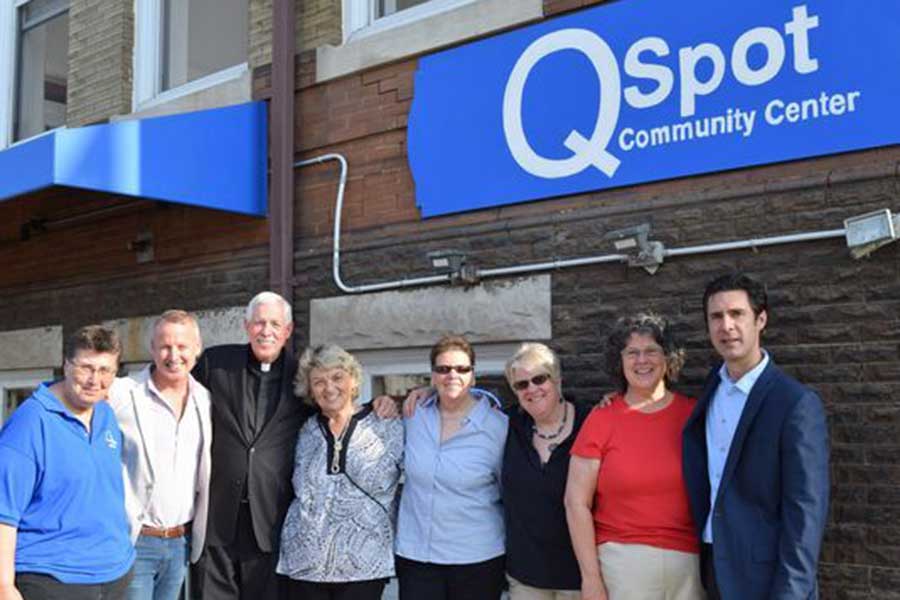On a sunny Super Bowl Sunday, a group of friendly associates were eating pepperoni pizza and drinking iced tea at the First Unitarian Church in Philadelphia. They weren’t there for the match-up between the Patriots and the Rams. “I could care less about this,” said Maria Watts Newman with a laugh. “Not without the Eagles.”
What a group of teachers, therapists, pastors, team organizers and community leaders — along with a handful of smart and street savvy, gay black teens — were doing at the 21st and Chestnut street church and civic center on Sunday was holding a town hall-like introduction to Q Spot Philly. The goal was to re-define and refine the group’s social mission statement toward providing a safe space for LGBTQ young adults in Philly. They were there to help recruit members and promote programming, set up regular meeting schedules, and, in accordance with the meeting’s notes, attract/develop partnerships and cultivate sponsors to help grow and sustain the organization’s outreach and educational initiatives.
“Everyone — feel safe when you come here,” program’s creator Quincy Greene said at the top of the meeting.
Created by Greene as a resource program for the gay/trans young community members and all matters of social justice, Q Spot Philly (QSP) isn’t solely about keeping LGBTQ teens safe, healthy and psychologically and fiscally sound (positive mental health and financial independence initiatives are high on the QSP agenda).
“Financial security and all forms of health concerns — those at risk, those concerning mental well-being — are a priority for Q Spot,” said Watts Newman, an adviser and board member. “Knowing all the resources available to them is crucial to their education and empowerment.”
Greene’s organization is also about developing a sense of community among these same youth to create new leaders and additional, continuing networks. “If you have stake in this, you’ll make it happen,” Watts Newman said.
Better put by one of the attending teens, survival skills are of utmost importance, whether developed through QSP programs or on their own. “Everyone knows how to steal. Not everyone knows how to cook and wash clothes. We’d like to get to a point where we don’t have to trick or do credit-card scams.”
To that end, during this first meet-up, all attending black teens — along with speaking their hard truths about how it is getting by on Philly’s streets, tricking and hustling — joined up with group leadership in individual teams to create events and activities that would raise awareness and funds for QSP’s future.
Greene, the president of the Educational Justice Coalition — the nonprofit created in 2008 from which Q Spot Philadelphia evolved as a full-fledge entity in 2011 — has been at this mission and has had this vision for some time. As Q Spot has never had a dedicated funding resource, much of its work has been out-of-pocket, without pay for its advisory board or programs.
“Oh boy, some of that has been out of choice, since we started in 2008 as a volunteer organization whose first goal was to create an LGBTQ-friendly high school based on the Hetrick-Martin Institute for LGBTQ Youth in New York,” noted Greene.
Because Greene and those working with him encountered local resistance to creating that school at first blush (“we’re not done with that concept,” he said), Q Spot’s then-new goals were to create an educational and awareness-based advisory-community board to continue with a similar feel.
After re-focusing its mission, Q Spot set up meeting space, first, at Broad Street Ministry in 2011 with volunteers and in-kind donations. “I’m not a wealthy person, but I reached into my pockets as often, far and as deeply as I could,” Greene said. “After Broad Street Ministry decided they wanted to charge us, we moved to William Way Center, which does charge, but was more affordable.”
In 2017, Greene put a pause on Q Spot to catch his breath, only to reestablish it in 2018, with a surprising number of the same people on board in an advisory capacity. With that, Greene was happily surprised to see such a full and rich turnout for this initial town hall on Super Bowl Sunday — not just teens, but advisers.
“Because we took a hiatus, we knew we would lose some of our constituents. But this turnout was great, and I believe that those in attendance show off how much potential this committee and community advisory board has going forward.”
Watts Newman, an educator and finance manager for several top tier area agencies, noted that students and young people of minority status and color tend to be at a disadvantage at knowing how to navigate resources.
“In addition to the support that connects them to worthy opportunities for employment or schooling, I’m there as a support — as a navigator — to help them break through any forms of adversity that may stop them from going forward,” she said after Sunday’s meeting. “I think this meeting generated enough good information so that those in attendance will get other youths in the area to come through Q Spot in the future. We’re just advocates, but we can’t be the only ones. We want each of these youths to become ambassadors, to articulate, advocate and educate for themselves and the needs and demands of other LGBTQ youths around them. And then for THOSE youths to pick up the ball and do likewise.” n
